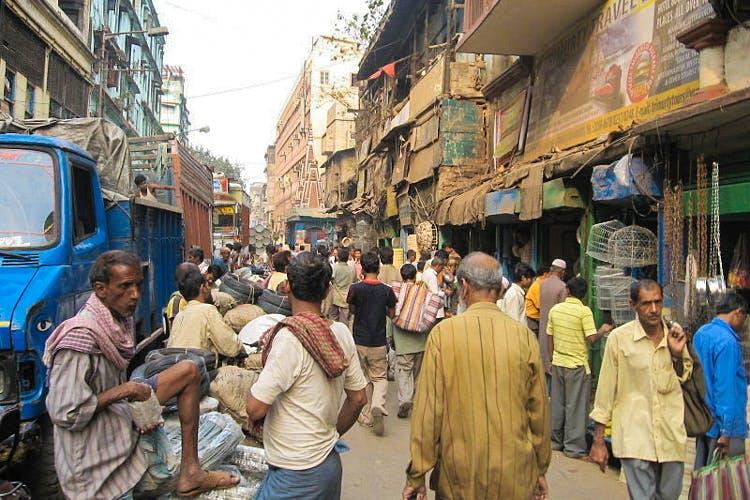Mutias of Kolkata’s Burrabazar: After Extreme Hardships, Inching Towards Normalcy

Kolkata: For the thousands of mutias (porters/headload workers) in the city’s Burrabazar, Eastern India’s largest wholesale market, there was no inkling when they returned from their native places after celebrating Holi in the third week of March that they were in for a shock and circumstances would force them to go back to their near and dear ones, braving extreme hardship in the blazing sun.
The countrywide lockdown clamped by the authorities from the midnight of March 23-24 to combat a raging Covid-19 left the mutias without their daily rozgar (employment). A tortuous journey back to the native places in Darbhanga, Begusarai, Barauni, Bhagalpur, Nalanda, Gaya, Nawada and Muzaffarpur was the only option for an estimated 40,000 Bihari mutias. They account for over 60% of the total of around 60,000 mutias in the Burrabazar, which is also one of the largest wholesale markets in the country. The others are mostly from Odisha, Jharkhand and UP. There are about 500 Nepali mutias too; earning their livelihood in the cloth business. Their experience in hardship may have varied somewhat; but they suffered too. Only a few hundred chose to live in greater hardship here.
The Burrabazar is a place where one can find almost anything under the sun. Garments, the whole range of consumer products, toys, steel products, a large number of hardware items, tarpaulin sheets, jewellery and what not. In the Posta area, the whole range of grocery items is available. It was a question of maintaining the supply chain and at one stage, Chief Minister Mamata Banerjee urged the traders and businesses here to observe all the prescribed precautions and gradually resume business. Absence of transport services was the biggest hurdle. After some relaxation in the lockdown norms was allowed, there was partial resumption from the second week of June.
Initially, for quite some time, the bazaar was functioning on alternate days – if one shop opened on Monday, the shop next to it would open on Tuesday and that too for restricted hours – 11 am to 4 pm against the normal of 11 am to 7 pm, explained president of Tenant Welfare Association Ranjit Surana, who owns a textiles business. Out of a total of 12 gates, only two – one for entry and one for exit – were kept open and extensive arrangements for sanitisation and use of thermal guns had to be ensured, Surana told NewsClick.
It was a very painful, skeletal resumption, he said. During the complete lockdown phase, businesses were left with hardly any money. They did not receive dues from the parties they had made transactions with. Burrabazar and the grocery section at Posta would on any given day record a turnover of well over Rs 100 crore under normal circumstances. That became history, said Surana and seconded secretary of Tambapatti Merchants Association Ratan Sarkar.
Given this context and with the pandemic still in a virulent form in West Bengal, a sense of fear had gripped trade and business as they began opening their establishments according to predetermined schedules drawn up by each of the over 100 associations. For days together, with availability of transport services and mutias – the mainstay of the business here – remaining grossly inadequate, business owners had to sit out the duration they had kept their outfits open for and they veered round to the view things won’t improve for them before Durga Puja.
The situation that prevails now gives us a measure of confidence and we are looking forward to better days by the year-end, said treasurer of Tambapatti Merchants Association Panchanan Bhatter. While it would be safe to suggest that on an average 60% normalcy had returned, for some specific trades, it was back to pre-Covid-19, according to Bhatter. “And this has been possible as an overwhelming percentage of the mutias had returned from their native places and were providing the usual services.” The trade union leaders NewsClick spoke to – Maharana Pratap Singh of the Centre of Indian Trade Unions and Tarak Pal of the Indian Trade Union Congress – confirmed the return of the vast majority of the mutias. If Burrabazar had sprung back to life, it was because of the presence of the mutias without whose services transactions would never be completed, said Singh and Pal.
Singh is the president of Kolkata Mutia Mazdoor Union and Kolkata Rickshaw and Van Pullers’ Union. He is also closely associated with the Janpath Paribahan Mazdoor Union. Pal is the key office-bearer of Shops & Establishments Shramik Karmachari Union, Tyre Trade Employees Union, Calcutta Merchant Karmachari Union and Chhata Karkhana Shramik Sanstha.
Asked for how long they had to live without their normal rozgar, the mutias said it was anything between three and a half months and four months.
Surana and Sarkar suggested that considering the hardships they had to encounter, payment of some extra remuneration for their services was “facilitated”. Many of them had to “arrange funds” before they set out for their native places. But, the trade union leaders did not readily endorse this claim. The mutias’ daily average earnings were between Rs 300 and Rs 400 for the various kinds of services they rendered. It could be more or even less -- especially if old men, who had spent years here as mutias, were handling lighter jobs, said Bhatter.
According to Surana, it is quite common in Burrabazar and Posta that well before the fathers become old, the sons or the kin join them and the tradition continues. “We have very cordial relations with the mutias; we trust each other. We do not look down upon them. It’s just not possible to run our business without their services. They are an inalienable part of Burrabazar,” he emphasised.
From what NewsClick gathered after interacting with a cross-section of sources, it appears that despite all the claims by the Centre and the state, “they did not qualify themselves for any relief, either by way or cash or grains for free”.
Meanwhile, Bhatter informed NewsClick that Maheshwari Sabha, the umbrella organisation of over 15,000 businessmen of Burrabazar, runs two schools, upto class XII, a health institute and Maheshwari Audyogic Shiksha Kendra for training youths “in modern business practices and helping them to decipher the ever-increasing complications”.
Get the latest reports & analysis with people's perspective on Protests, movements & deep analytical videos, discussions of the current affairs in your Telegram app. Subscribe to NewsClick's Telegram channel & get Real-Time updates on stories, as they get published on our website.
























